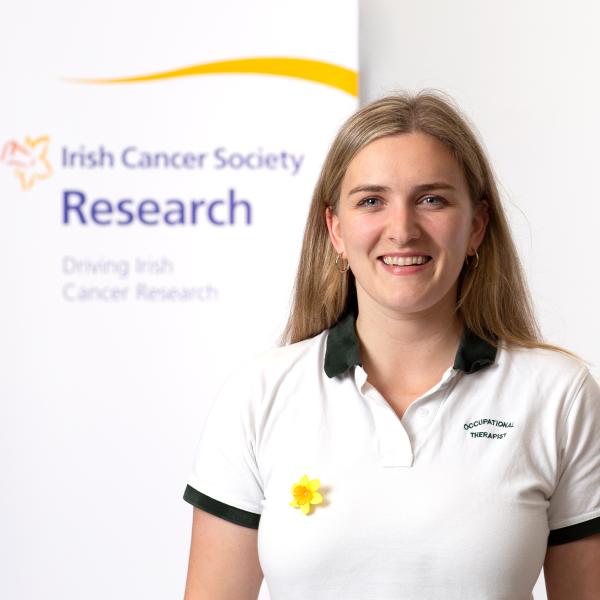Research project aims to light a pathway back to work and education for young people beyond cancer treatment

Finding your way in life as a young person can be challenging enough without having to also deal with the difficulties of a cancer diagnosis at such a formative stage.
Imagine having to deal with ‘brain fog’ or fatigue from chemotherapy while studying for State exams, or the prospect of losing your hair as a teenage girl or boy during what can be a sensitive phase for anyone.
These are among the many issues that have lain unaddressed for adolescents and young adults who have undergone cancer treatment, something that occupational therapist Naomi Algeo wants to use her time to help change.
The Trinity St James’s Cancer Institute researcher was recently announced as a recipient of the Irish Cancer Society Allied Health Professional Award, which will allow her to split her time between her daily role as an occupational therapist and researching how to improve supports for this group.
“Occupational therapists focus on activities of daily living, so that can be everything from self-care – being able to get washed and dressed yourself in the morning – to navigating employment and education roles, and re-engaging with hobbies,” explains Algeo.
“It’s important that we’re not just there during treatment, but that we’re there to support children and adolescents navigating a return to school or college, or re-entering the workforce,” she adds, before mentioning some examples of such support in action.
There was one young patient who wanted to play sports and had to juggle this with his schoolwork after undergoing cancer treatment, but he was still experiencing some fatigue and brain fog so we looked at strategies that he could use to manage this and find balance in his daily life.
“We also had a secondary school student who was coming to terms with a new diagnosis, and that she was going to lose her hair during treatment. She was really eager to access online opportunities to keep up with her classmates in school, and she was also taking part in an award programme that she wanted to complete.
“We had to be creative about how we could support her to achieve this while she remained an inpatient in hospital. We were able to put a structure into her day-to-day routine to help her, as well as link her into support services for wigs and the Look Good Feel Better programme.
“In the context of work, we had a young person who had to have hip replacements during her treatment. Her job is computer-based, so we looked at how we could adapt her workspace in order for her to be able to work without being in pain from sitting for long periods of time.”

The Irish Cancer Society award will allow Algeo to look at the ‘bigger picture’ of how adolescents and young adults can be systematically supported in ways that are most beneficial to them in order to help them live their lives to the fullest after treatment.
“There’s been a real gap in terms of research in Ireland looking at the return to education and work for this group, so we need to look at this from a very foundational level before we look at establishing a programme or intervention”.
“Through our project, which I’m carrying out in conjunction with academic lead Prof Deirdre Connolly, we want to find out what are the physical, psychological and the social health issues that are impacting people going back to school, college or work through conversations with people in this area.
“Following on from that we want to hear the perspectives from adolescents and young adults on what support services we could put in place in Ireland for these types of things. It is expected that the results of this project will inform a programme or intervention that can then be introduced down the line to help them on a practical basis.”
Algeo says it is immensely helpful to have such a supportive environment for research in both St James’s Hospital and Trinity College, as well as funding assistance from the Irish Cancer Society.
“Research on treatment is so important and will remain important, but because more people are living longer, and surviving and thriving after cancer, we’re now looking at these important issues that maybe weren’t looked at or focused on so much before.
“We were so excited when this award was launched. The beauty of it is that we’ll be able to translate research into practice quicker as I’ll be in a dual clinical and research role. The Irish Cancer Society are brilliant for getting feedback from researchers, so it was great to get that dedicated allied health award.”
The work of Irish Cancer Society funded researchers is made possible through the kind support of the public.
To help support our cancer research please visit www.Cancer.ie/Donate
Contact the Irish Cancer Society Support Line
If you have worries or concerns about cancer, you can speak confidentially to an Irish Cancer Society Cancer Nurse through the Freephone Support Line on 1800 200 700.
Monday to Friday, 9.00am - 5.00pm

For more information
Phone
1800 200 700
